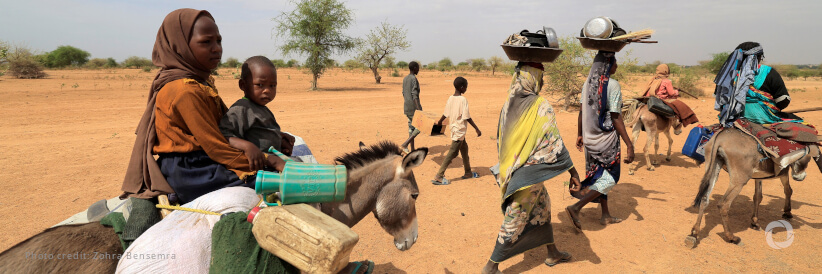The international humanitarian law’s (IHL) principles are designed to protect civilians, healthcare workers, and humanitarian personnel and infrastructure in times of conflict but are increasingly disregarded resulting in loss of life, immense suffering, and increased and prolonged displacement.
As we observe World Humanitarian Day on August 19th, DRC Danish Refugee Council is calling attention to this critical issue that impacts millions of lives.
“It’s not just a breach of the law, it is an attack on our shared humanity when civilians and aid workers are targeted. The dire humanitarian situations in Gaza and Sudan highlight the urgent need for all parties in a conflict to respect international humanitarian law and for impunity to end. The normalization of disregard of IHL creates less accountability, which makes it more likely for conflicting parties to continue to disregard IHL, resulting in an increasingly dangerous environment for both humanitarian personnel and civilians,” says Charlotte Slente, Secretary General of DRC Danish Refugee Council.
Violations in Gaza and Sudan
Families can’t find safety in Gaza. More than 40,000 people have been killed in Israel’s continued military offensive on Gaza over the past ten months. Hospitals, schools, residential areas, and camps sheltering displaced civilians have been targets of attacks in clear violation of international humanitarian law. The entire 2.1 million population of Gaza is in urgent need of aid, yet access to humanitarian assistance has been severely constrained due to the closure of border crossings and stringent restrictions greatly exacerbating the unprecedented humanitarian crisis unfolding in Gaza.
Nine out of ten people have become internally displaced due to the continued use of explosive weapons in populated areas, and indiscriminate and disproportionate attacks violating basic principles of the rules of war.
In Sudan, the ongoing conflict has also resulted in widespread suffering and left more than 12 million people displaced. Civilians and aid workers are often caught in the crossfire due to indiscriminate attacks, lack of necessary precautions before an attack, and disregard for civilians’ needs. This is a severe violation of international humanitarian law. Millions are left without access to lifesaving assistance since it has become increasingly difficult for humanitarian organizations to operate with the humanitarian crisis only growing day by day. Earlier this month a famine was declared for about 500,000 internally displaced people in North Darfur.
A deadly year for humanitarian workers
A tragic milestone was reached last year when a record number of 460 humanitarian workers lost their lives while serving those in need. This year is set to become even worse.
“The loss of so many aid workers is heartbreaking for their families and colleagues, but also for the millions of people who depend on their help. But we cannot let fear or violence stop us from providing critical assistance. Protecting aid workers’ lives is essential to ensure that aid reaches those who need it most,” says Charlotte Slente.
Concrete steps must be taken
World Humanitarian Day is a time to remember the importance of protecting civilians and those who risk their lives to assist them. Even in war, some rules must be followed.
International humanitarian law exists to preserve our shared humanity, and all parties in conflict must respect these principles. Violations by one side should never be an excuse for others to lower the bar. Instead, all warring parties must take concrete steps to protect civilians and the critical infrastructure they rely on.
Danish Refugee Council is urging the international community to take immediate action:
- Hold those who violate international humanitarian law accountable.
- Reinforce the legal frameworks that safeguard human dignity during armed conflicts.
- Strengthen the protections for civilians and aid workers in conflict zones.

